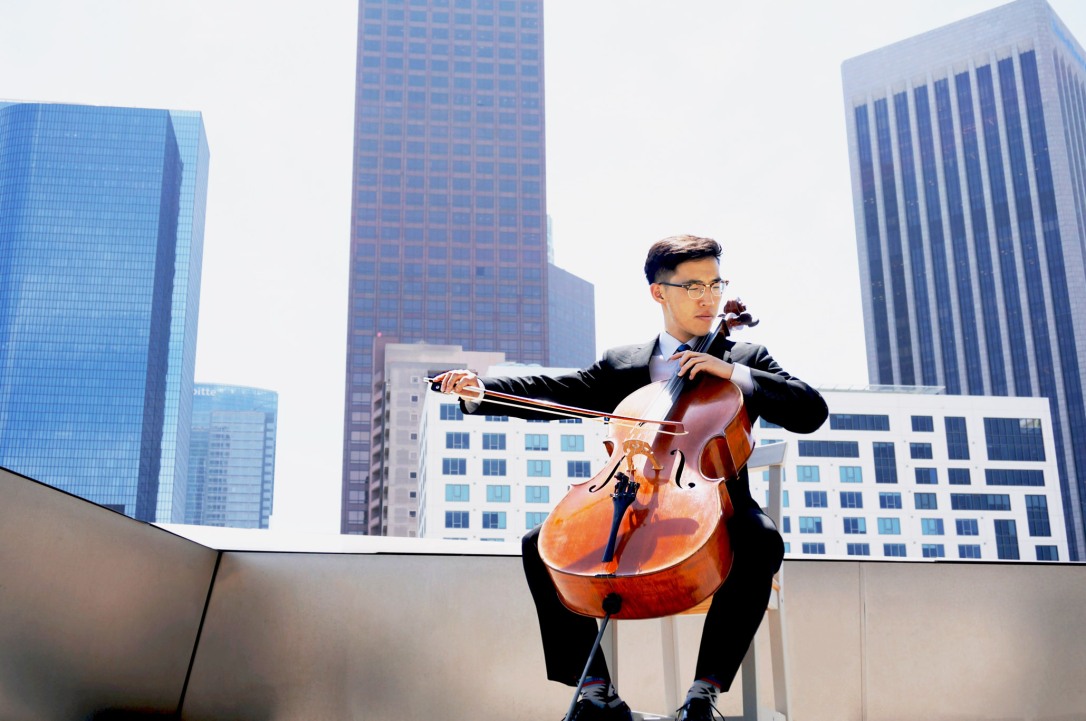As we get ready to perform Brahms’s Double Concerto for Violin, Cello and Orchestra, it is my pleasure to ask our soloist Eunghee Cho some questions about this piece, about music in general, and about his role as Artistic Director of the recently founded Mellon Music Festival in Davis, California.
Christian Baldini: Eunghee, it is a pleasure to welcome you back to your hometown to showcase you as our soloist for this marvelous piece of music. Tell us why you chose to perform this piece? What is so special to you about it?
Eunghee Cho: I’ve found that collaborating with inspiring musicians on an incredible piece of music motivates new dimensions in my perception of sound and musicality. The double concerto allows for the creation of a sonic über-instrument from the cello-violin combo simultaneously manifesting alongside their unfolding conquest with the full orchestra. I can’t wait!
CB: And tell us about your soloist partner, violinist Stephanie Zyzak. How did the two of you meet, and would you say you have much in common with regards to music making?
EC: We first met in the context of a conductorless chamber orchestra. During our first cycle, we were both principals for Shostakovich’s C minor Chamber Symphony – a transcription of his 8th string quartet for string orchestra. I was absolutely floored by the anguish she vocalized in that opening movement solo. Within those first few minutes, I knew that it could only ever be a privilege to work with such a powerful artist.
CB: Tell us about how you decided to found the Mellon Music Festival in Davis. I had the pleasure of attending some of your events, and it gives me great comfort to see so many talented young people working together and offering high quality music performances. How did you come up with this idea, and where would you like to go with it?
EC: In a nutshell, Davis was missing an international chamber music festival and I had some buddies who loved performing chamber music! More specifically though, so much of the current climate of classical music appreciation is predicated on a snobby, elitist stereotype of the genre when in fact it can be one of the most inclusive and accessible media of expression. To combat the stigmas, our programming and outreach efforts actively exploit the inherent beauty and expressive potential of the classical genre. Beyond nurturing a community around dedicated festival engagement, we’ll make classical music in vogue once again!
CB: What are your choices for programming music? I noticed that in future concerts you will be performing more recent repertoire (works by Ligeti and Golijov), which seems like a welcome development. Are you planning on commissioning works in the future perhaps too?
EC: Of course you can’t go wrong when programming the classics, but we are also advocates of an evolving music tradition that embraces musical innovation, especially when we have the chance to pick the brains of living composers. I can only imagine how bummed I’d be if I found out after I died that I could’ve asked the 21st century edition Beethoven how to perform precisely his hugely varying dynamic and articulation varieties. In the past, we commissioned, with support from a Boston-based grant, two new works for the festival in our Spring 2018 preview concerts with the Holes in the Floor cello quartet. Commissions are certainly in our future!
CB: What is your ideal job? Where would you like to see yourself in 10 years?
EC: My ideal job would be spending my weeks alternating between intensive musical collaborations and work as a professional dog walker.
CB: If you had to give advice to a very young musician starting out, what would you say to them? What should they do in order to become a successful musician?
EC: A lot of the time it will feel like the music is kicking your butt, but if you can push through the temporary grind, the product is one of the greatest imaginable rewards. Also, find inspiration in as many of the oldies (i.e. Kreisler, Piatigorsky, Szigeti, Casals, Tertis) as your 24-hr days will allow.
CB: Do you enjoy reading? Sports? What other activities do you enjoy outside music (and besides dogs!)?
EC: Mostly resulting from a general paranoia, I tend to arrive at airports hours before my flight’s scheduled departure so I’ve adopted another hobby that can aptly be described as “people watching.” Also, I have hardly ever said no to a game of pick-up soccer.
CB: Thank you very much for taking the time to answer these questions. We look forward to a beautiful performance together! And maybe we’ll play soccer together someday (another passion of mine!)

As an avid chamber musician, Eunghee has collaborated in performances with artists such as Midori Goto, David Shifrin, Elton John, François Salque, and the Borromeo String Quartet, and has performed as a guest artist with A Far Cry, Da Camera Society, and the Chamber Music Society of Sacramento. Previous festival engagements include the Norfolk Chamber Music Festival, Taos School of Music, Bowdoin International Music Festival, Rheingau Musik Festival, Festival International d’Echternach, and Rencontres Franco Américaines de Musique Chambre in Missillac, France. He is Artistic Director and Founder of the Mellon Music Festival in Davis, CA.
Eunghee graduated magna cum laude and as a Steven & Kathryn Sample Renaissance Scholar from the Thornton School of Music at the University of Southern California with a Bachelor of Music in Cello Performance and a Minor in Biology. Following his completion of a Master’s degree at the New England Conservatory of Music he is currently enrolled in the conservatory’s Doctor of Musical Arts Program under the tutelage of distinguished pedagogue Laurence Lesser. His previous instructors include Paul Katz, Andrew Shulman, Andrew Luchansky, Richard Andaya, and Julie Hochman. He plays on a 1930 Anselmo Gotti cello on generous loan by Colburn Foundation. Away from the cello, Eunghee enjoys neighborhood pick-up soccer, everything about dogs, and dawdling in local coffee shops.










